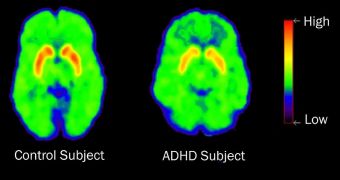Researchers at the Kennedy Krieger Institute (KKI) say in a new research that they managed to uncover evidence indicating that attention deficit hyperactivity disorder (ADHD) is responsible for changing neural development patterns in the young human brain.
When comparing children with ADHD with kids who had not been diagnosed with the condition, the team discovered significant differences in these patterns in several areas of the brain. The correlation held true even for kids with early symptoms.
The work was carried out on small children, all of them of preschool age. It is currently estimated that ADHD affects no less than 2 million children in the United States alone, and experts say that the disease is the most widely-used pediatric behavioral diagnostic.
Inattentiveness, hyperactivity and impulsivity are its main symptoms, though many scientists believe that all children manifest them, and that they are entirely normal. The new work comes to disagree with this point of view, indicating discernible changes in the brains of kids with ADHD.
In past studies, experts have determined that children who experience an early onset of ADHD symptoms, at the age of 4 or more, tend to fail academically and to repeat grades more than their peers.
The new work is the first to used magnetic resonance imaging (MRI) to look at the brains of 4-year-olds. Other teams that used MRI only investigated children at the age of 7 or older, PsychCentral reports.
Experts focused their attention on the volumes of cortical and basal ganglia, since these regions of the brain were found to be the most severely affected by ADHD in past studies. The caudate nucleus was also found to develop abnormally in ADHD patients.
“Clinically, this abnormal brain development sets the stage for the symptoms of ADHD that contribute to cognitive challenges and problems in school,” explains KKI scientist Mark Mahone, PhD, the lead author of the new study.
“Earlier identification and treatment of children presenting with attention problems in the preschool years may minimize the impact of ADHD in the long-term,” the expert says.

 14 DAY TRIAL //
14 DAY TRIAL //